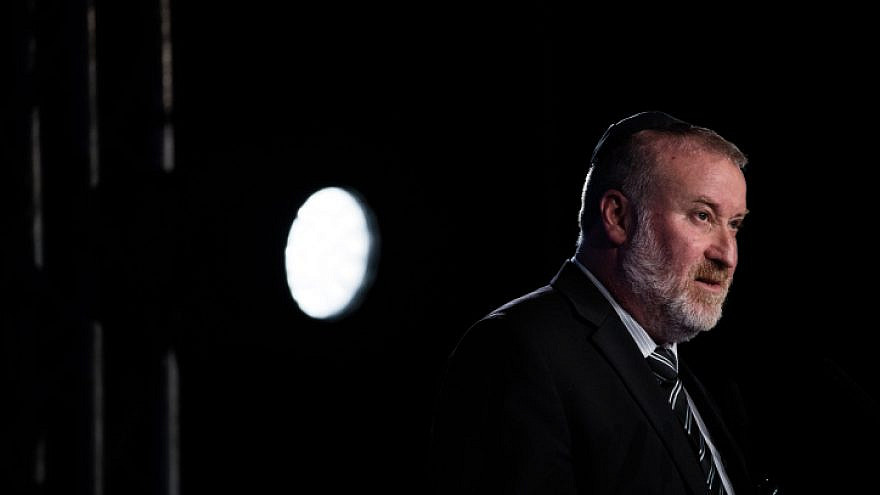When Israeli Prime Minister Benjamin Netanyahu began the process of trying to form a government 28 days ago, he had 55 Knesset seats supporting him—32 from his Likud Party, nine from Shas, eight from United Torah Judaism and six from Jewish Home/New Right. When he announced earlier this week that he was returning his mandate to President Reuven Rivlin, he had not a single seat more.
Following the Likud leader’s inability to reach a majority, Rivlin officially turned to challenger Benny Gantz on Wednesday, granting the Blue and White leader 28 days of his own to succeed where Netanyahu failed.
The main reason for Netanyahu’s failure to form a government was Blue and White’s refusal to join a unity coalition, citing the corruption charges hanging over the prime minister as the main reason for it would not sit in a government with Netanyahu.
“It’s time for Blue and White to climb down from the anti-Netanyahu tree,” former Israeli Education Minister and New Right Knesset member Naftali Bennett told JNS.
“I disagree with Netanyahu on many issues and am critical of decisions he has made. But I also think he has done a lot of good for Israel, both for its economy and security. I don’t think it’s right for him to be toppled given the minor charges against him,” said Bennett. “Netanyahu should not be replaced via the justice system and media that have been out to get him from day one.”
Nevertheless, Blue and White still remains committed to forming a national unity government.
“We in Blue and White are waiting patiently to be given the mandate to form a government. When we receive it, we will work to form the government that we promised the people of Israel—a national unity government that will place the good of the citizen before all else,” Blue and White MK Boaz Toporovsky told JNS.
However, at the moment, Gantz only has 44 mandates supporting him—33 from his Blue and White Party, six from Labor and five from the Democratic Union. The 55 mandates of the right-wing/religious bloc supporting Netanyahu have pledged not to join a Gantz-led coalition. That leaves Avigdor Lieberman’s Yisrael Beiteinu Party with its eight mandates and the Joint Arab List with its 13 mandates.
The Joint List has already declared that it will not join a government, while Lieberman is unlikely to join a center-left government, and even if he did, that would only give Gantz 52 seats.
Much depends on outcome of corruption charges
So does Gantz have any chance of success during his 28-day mandate?
The answer is yes, if a slim one: the formation of a minority government. In theory, as long as the Joint List votes for the government even if it doesn’t join it and Lieberman agrees to abstain from the vote, then Gantz could bring a 44-mandate government to the Knesset and the vote would pass by 56-55.
In the video statement in which he announced the return of the mandate to Rivlin, Netanyahu warned of this possibility, saying if such a government is formed, then he will serve as head of the opposition and do everything possible to topple it.
While the chances of Lieberman abstaining and thus allowing the formation of such a government are close to zero, Bennett nonetheless criticized Blue and White for not outright rejecting the option of a minority government with the Joint List support, saying that “because of their hatred for Netanyahu, the leaders of Blue and White have lost their minds.”
The Joint List, said Bennett, includes anti-Israel parties that support terrorism, and it was “unfathomable” that Blue and White would even consider accepting their support.
There is also one other possibility: Blue and White has been hoping that Israeli Attorney General Avichai Mandelblit will announce his intent to indict the prime minister during its 28-day mandate, and that this will lead members of Netanyahu’s 55-seat coalition to jump ship and support Gantz for prime minister.
However, following pre-indictment hearings earlier this month in the three corruption cases facing the prime minister, there are strong indications that Mandelblit will drop the most serious of the charges against Netanyahu—bribery—and may completely close at least one of the cases.
Netanyahu believes that these developments will increase support for him among his base and put him in a strong position to win outright if the country heads to a third election, with enough seats to form a right-wing/religious government.
At the very least, any reduction in the charges will further strengthen his already solid support among Likud Knesset members, eliminating any hope of them supporting anyone besides him for the country’s top job, both during Gantz’s 28 days and the following 21-day period during which any of the 120 Knesset members may be able to attempt to form a government.
So at the moment, all eyes are on the attorney general, who is expected to announce his decisions by mid-November—smack-dab in the middle of Gantz’s 28-day mandate.


























